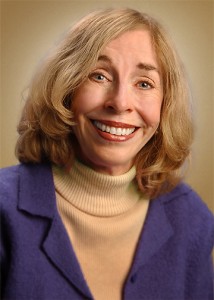Election Coverage Increasingly Focused on Presidential Candidates’ Wives, MU Researcher Finds
By Jessica Pollard
Columbia, Mo. (April 27, 2004) — Twenty-first century media coverage of presidential and vice presidential candidates and their lives now encompasses another facet — their wives. A new study by a Missouri School of Journalism researcher found that these women are becoming increasingly noticed among journalists during the election campaign.

Betty Winfield, professor of journalism, and journalism doctoral candidate Barbara Friedman studied the 2000 election coverage of Laura Bush, Tipper Gore, Lynne Cheney and Hadassah Lieberman. The wives in that election presented a challenge to the media, Winfield said, as they did not easily fit the mold of traditional first or second ladies. The media noticed their unique educational and life experiences that prepared them to serve in their public and political roles.
Coverage of Lynne Cheney stressed respect gained through experience in politics and public life. She was said to have “an unusually high profile for a would-be second lady,” and a Washington Post article stated that she “held several important jobs of her own before she became her husband’s official introducer.” Hadassah Lieberman’s status as the daughter of Holocaust survivors could only be connected to symbolic worthiness and humanity.
One campaign theme stressed by media was the sacrifice of personal ambitions, interests and public opinions for their husbands’ political careers, Winfield said. Laura Bush consistently declined to present opinions countering her husband. She told a CBS reporter “When I differ with my husband, I’m not going to tell you.” In addition, George magazine wrote “Laura Bush may not have much to say on her own behalf, but when it comes to defending her husband, she’ll brave any crowd.”
Tipper Gore and Bush also were cited on their ability to put public life before their own. A New York Times article called them “ambivalent recruits, as content in the backyard as in the foreground, yanked by their husbands’ desires into races and places they might never have chosen for themselves.”
During the 2000 presidential campaign, a persistent anti-Hillary Clinton theme appeared, as news coverage framed the four candidates’ wives as primarily quiet supporters, Winfield found. George Bush told a journalist “my wife is not Hillary Clinton. She’s not going to hog the spotlight. She’s not going to push forward her own political agenda at my expense.”
Winfield’s study was published in a recent edition of Journalism & Mass Communication Quarterly.
Updated: December 13, 2019
Related Stories
Expand All Collapse All- 2022
-
2020
- Nov 23, 2020 Missouri School of Journalism's 'Missouri Method' going strong during 2020 general election
- Jun 22, 2020 2016 U.S. presidential election coverage was 'game changer' for journalists
- May 29, 2020 Two Missouri School of Journalism Graduate students receive 'best paper' at international conference
- Feb 25, 2020 Missouri faculty team receives AEJMC Senior Scholars grant to help in their study of articles written 'by journalists about journalism'
- 2019
- 2017
-
2016
- Sep 08, 2016 School to Join National Reporting Network for 2016 Election
- Jul 29, 2016 Research: Value of Interdisciplinary Teams
- Jul 27, 2016 Students Create New Guide to Covering Race and Hunger
- Jul 22, 2016 Yang Cheng Wins Research Award
- Jul 07, 2016 Tim Vos Wins Research Award
- Jun 30, 2016 Research Takeaways
- 2012
- 2011
-
2010
- Oct 13, 2010 MU Researchers Find Celebrity Journalism May Contribute Positively to Consumer Health Behaviors
- Jun 14, 2010 Missouri Journalism Faculty, Students End Academic Year with Impressive Research Record
- Apr 15, 2010 Who Is Injured Determines Who Gets the Blame
- Mar 19, 2010 Public Health Meetings Help Communities During Epidemics, MU Study Indicates
- Mar 04, 2010 MU Researcher Finds More Effective Ways to Converge Media
- 2009
- 2008
-
2007
- Jul 31, 2007 Portrayal of Journalists in Harry Potter Books Doesn't Negatively Affect Young Readers' Perceptions
- Mar 20, 2007 Negative Newspaper Articles about Clinical Trials Decrease Public Willingness to Participate, Study Finds
- Feb 15, 2007 Newspaper Study: Investing in the Newsroom is Good for Business
-
2006
- Nov 10, 2006 Building a Better Online Community
- Aug 28, 2006 Homeland Security and Media Evaluate Terror Threats Differently
- Jul 07, 2006 Having Control Might Be Good, but It's Not Interesting
- Mar 08, 2006 Reporters Believe General Public Is Unable to Understand Scientific Issues, MU Study Finds
- Feb 06, 2006 New PRIME Lab Web Site to Facilitate Sharing of Media Effects Research
- 2005
- 2004
- 2003